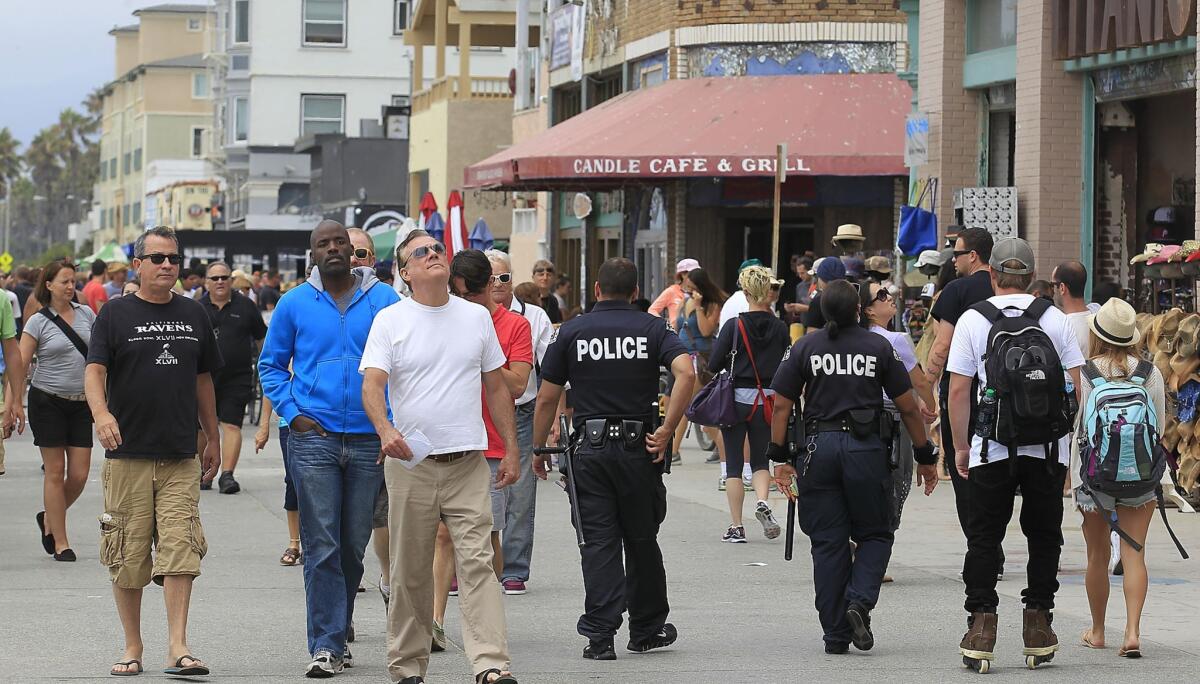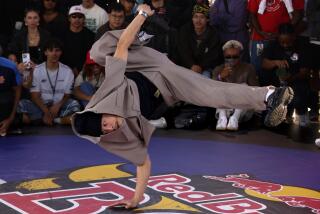Op-Ed: Venice tried to oust the LAPD 50 years ago. Today we’re talking about the same issues

July 4, 1969, was a day of festive parades and picnics across Southern California: Pacific Palisades had its annual “Americanism” parade, the West Covina parade had two Vietnam vets for its grand marshals and Claremont had an “Old Tyme Parade.”
Venice didn’t have a parade at all.
The Los Angeles Police Department rejected the area’s application for a permit for a Fourth of July parade down the boardwalk, and when it seemed like people might turn out anyway, the city mobilized a massive force to block them, stationing hundreds of police officers along the entire proposed parade route. The police had run many sweeps in Venice over the previous few years, but this was an unprecedented operation, involving police boats, helicopters, a command post and preparations to arrest and hold hundreds of people.
Why such a fuss? The proposed parade, organized by the Free Venice Organizing Committee, was intended in part as a strong anti-police statement. The Venice activists did not seek to reform the LAPD, or cut the budget of the LAPD; instead, they sought to secede from Los Angeles and become an independent city with a police force under community control.
The parade was to end at the Venice Pavilion on the beach with a reading of a “Declaration of Independence.” Like the 1776 document, the Venice declaration was long and detailed, and the section on police was particularly pointed. “The LAPD has terrorized our community,” the activists declared, “breaking into our homes, confiscating our property, harassing and arresting residents without justification, beating residents on the streets and in jail, and denying us use of public places for peaceful assembly.” An independent city of Venice could have a police force that would be “non-violent.”
Venice had been an independent city when it was founded in 1905, and it remained one until it was annexed by the city of Los Angeles in 1926. De-annexation was legally possible if a majority of residents voted in favor of it, and the July 4 event had been planned as the kickoff for an independence campaign.
At the hearing for the parade permit a few weeks earlier, Free Venice organizers explained that they expected about 700 people to turn out for a festive march, with “children, flags, and balloons.” The police said they expected 30,000 people at the beach on July 4, and that a parade that large on the boardwalk would make it impossible to get emergency vehicles down to the beach. The parade organizers replied that they would comply with all traffic requirements. The Police Commission then voted unanimously to reject the application.
After the parade permit was denied, and the plans for a major police mobilization at the beach became clear, Free Venice made a painful decision: The parade would be cancelled, and instead a silent vigil would be held outside Venice police headquarters, several blocks from the beach. The decision was explained in a leaflet distributed widely on July 3: “We know of no instance where the police have prepared for a riot without producing one,” the group explained. The silent vigil at the Venice City Hall would restate the goal of “living in an independent city” where “the savagery of the Los Angeles police is only a bitter memory.”
Police turned out in force on the boardwalk anyway that July 4 and arrested 61 people, with most of the arrests coming after the TV cameras left at 10 p.m.
Of course the Venice independence movement failed, and Venice has been gentrifying ever since. What might have worked for Venice in 1969 obviously can’t work for the entire city in 2020, since the people of Los Angeles don’t have the option of seceding to free themselves from the LAPD. But political will is growing to transform the city’s budget and defund many traditional forms of policing, investing instead in housing security, public health and healthcare, and mental health services.
That’s what the People’s Budget calls for, and it’s as fresh and welcome a document as Venice’s Declaration of Independence was in 1969.
Jon Wiener is co-author, with Mike Davis, of “Set the Night on Fire: L.A. in the Sixties,” from which this was adapted.
More to Read
A cure for the common opinion
Get thought-provoking perspectives with our weekly newsletter.
You may occasionally receive promotional content from the Los Angeles Times.










